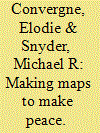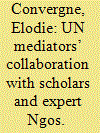| Srl | Item |
| 1 |
ID:
142279


|
|
|
|
|
| Summary/Abstract |
This article analyses how United Nations peacekeeping operations are harnessing geospatial technology, including high-resolution satellite imagery and geographic information systems (GIS), in the furtherance of peace and security. We argue that it is strengthening the ability of peacekeepers to accomplish their mandated tasks, including the demarcation of international boundaries, support for the negotiation of peace agreements, stabilization, the protection of civilians, human rights monitoring, electoral assistance, support for the extension of state authority and the provision of humanitarian assistance. However, it remains to be seen how and to what extent UN peacekeeping can continue to grow and expand its geospatial capabilities. We identify several challenges of an operational and political nature that tend to impede its utilization. A key question in this regard is whether politics will prevent peacekeepers from exploiting recent advances in geospatial technology. We conclude and synthesize our argument by developing a simplified framework for determining when and under what conditions peacekeepers can effectively harness geospatial technology.
|
|
|
|
|
|
|
|
|
|
|
|
|
|
|
|
| 2 |
ID:
143903


|
|
|
|
|
| Summary/Abstract |
UN mediators work more and more closely with academics and expertise-based non-governmental organizations, in particular through the Mediation Support Unit. The Organization appears to genuinely rely on them to conduct mediation and to strengthen its capacity in the area, to the point where it is sometimes difficult to operate a clear distinction between the two types of actors. This article analyzes why the practice of mediation today creates a demand for such expertise-focused cooperation. Beyond the need for flexibility and additional resources, the explanation lies in the prevailing feeling of uncertainty caused by today’s internal conflicts, for which the traditional state-centric lens is becoming irrelevant. In this context, the UN relies on knowledge produced by an epistemic community of peace and conflict scholars, and is embedded in a network of nongovernmental mediators with which it exchanges know-how, following the logic of communities of practice.
|
|
|
|
|
|
|
|
|
|
|
|
|
|
|
|